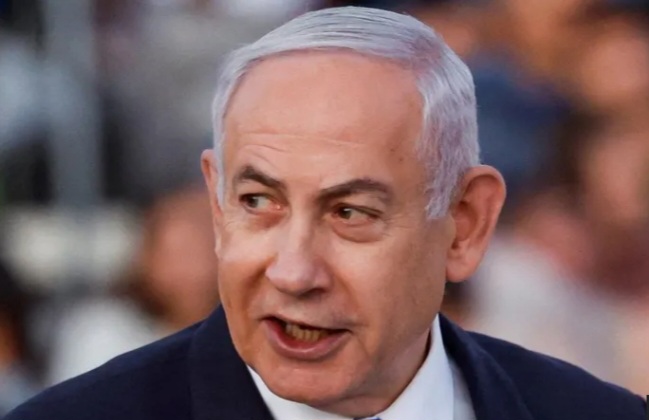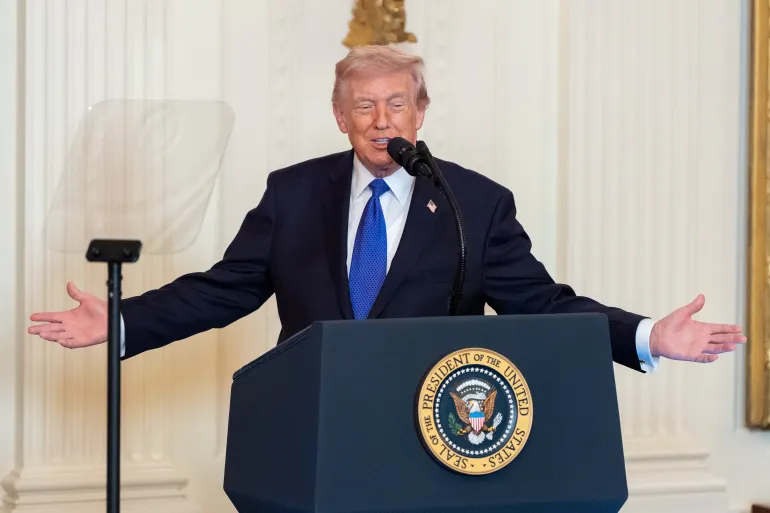Latest News
No 10 indicates Netanyahu faces arrest if he enters UK

Israeli Prime Minister Benjamin Netanyahu faces arrest if he travels to the UK, after an international arrest warrant was issued for him, Downing Street has indicated.
A No 10 spokesman refused to comment on the specific case but said the government would fulfil its “legal obligations”.
On Thursday the International Criminal Court (ICC) issued an arrest warrant for Netanyahu, along with Israel’s former defence minister Yoav Gallant, over alleged war crimes in Gaza.
The court’s member countries, including the UK, have signed a treaty that obliges them to act on arrest warrants.
Asked whether Netanyahu would be detained if he entered the UK, the prime minister’s official spokesman refused to comment on “hypotheticals”.
However, he added: “The government would fulfil its obligations under the act and indeed its legal obligations.”
This refers to the International Criminal Court Act 2001, which states that if the court issues a warrant for arrest, a designated minister “shall transmit the request… to an appropriate judicial officer”, who, if satisfied the warrant appears to have been issued by the ICC, “shall endorse the warrant for execution in the United Kingdom”.
The PM’s spokesman confirmed the government stands by the process outlined in the act and would “always comply with its legal obligations as set out by domestic law and indeed international law”.
He was unable to confirm which secretary of state would be involved in the process and did not answer questions about whether the government was seeking legal advice from Attorney General Lord Hermer – the UK’s top lawyer – in relation to the case.
Generally, arrest warrants and extradition requests from around the world must be sent to a special team in the Home Office for basic checks before they are acted on.
The UK’s legislation on the ICC says that the courts have the final say on whether an arrest and “delivery” of a suspect should go ahead.
Asked whether the PM was still willing to talk to Netanyahu, the PM’s spokesman said it was “obviously important that we have a dialogue with Israel on all levels”, describing the country as “a key partner across a range of areas”.
Last month Lord Hermer told the BBC he would not allow political considerations to influence his conclusions if the ICC were to issue an arrest warrant.
“My advice [on an arrest warrant for Mr Netanyahu] would be legal advice, based on analysis of the law,” he said.
“It’s not for the attorney to dictate what a government chooses to do. The role of the attorney is to provide fearless legal advice as to what the law requires, what the contents of the law is, and where the law takes you. And that’s what I’m going to do.”
Following the arrest warrants being issued on Thursday, Downing Street said the UK government respected the ICC’s independence and remained focused on pushing for an immediate ceasefire in Gaza.
The court also issued a warrant for Hamas military commander Mohammed Deif, who Israel says was killed in July, over alleged war crimes in relation to the 7 October 2023 attacks against Israel.
Shadow foreign secretary Dame Priti Patel criticised the ICC for drawing a “moral equivalence” between Israel’s actions in Gaza and the 7 October attacks.
She called on the government to “condemn and challenge” the court’s decision, describing it as “concerning and provocative”.
After winning power, the new Labour government scrapped its predecessor’s plan to challenge the right of the ICC to issue arrest warrants, saying it was a matter for the judges to decide.
The impact of the warrants will depend on whether the court’s 124 member states – which do not include Israel or its ally, the US – decide to enforce them or not.
US President Joe Biden has called the arrest warrant for the Israeli Prime Minister “outrageous “, saying there is “no equivalence” between Israel and Hamas.
However, officials from a number of European countries have made statements standing by the court and said they would implement its decision.
Both Israel and Hamas reject the allegations made by the ICC, with Netanyahu branding the warrant “antisemitic”.
Netanyahu condemned the ICC’s decision as “antisemitic”. Hamas made no mention of the warrant for Deif but welcomed the warrants for Netanyahu and Gallant.
French foreign minister Jean-Noel Barrot has told the BBC that the ICC’s decision “is the formalisation of an accusation, it is by no means a judgement”.
He told the Sunday with Laura Kuenssberg show: “We also say that we’ve condemned, in [the] strongest possible terms, the fact that humanitarian help has not been able to reach civil populations in Gaza while the situation is catastrophic.
“But in no way do we draw any form of equivalence between the Hamas leaders that have been targeted by arrest warrants by the ICC and the government of Israel.”
(BBC)
Latest News
Six US soldiers killed in Iranian strike on Kuwait base
Six American soldiers were killed in an Iranian strike against a military facility in Kuwait on Sunday, the US has confirmed.
US Central Command originally said three soldiers died in the incident but officials confirmed on Monday that the death toll had doubled, after one person succumbed to their injuries and two more bodies were found in the rubble.
Defence Secretary Pete Hegseth confirmed a US bunker in Kuwait was hit after a missile was launched during Iran’s original retaliation evaded air defences.
The six deaths are the only fatalities confirmed by the US military since it launched a new war against Iran with Israel.
Hegseth said a “powerful weapon” struck a “tactical operations centre that was fortified”, without providing further details about the site’s location.
Three US military officials with direct knowledge of Iran’s attack told the BBC’s US partner CBS News that the service members were in a makeshift office space in Kuwait.
They questioned whether the building had been adequately fortified, telling CBS News a trailer was being used as an office, with 12ft (3.7m) steel-reinforced concrete barriers to shield it.
The US has a long-standing defence relationship with Kuwait, and more than 13,000 American soldiers are stationed in the Gulf nation.
Iran has responded to attacks against it by launching missiles at Gulf countries allied with the US. Bahrain, UAE, Saudi Arabia, Oman and Qatar have all also seen strikes.
Separately in Kuwait, the US confirmed three fighter jets were downed after what it described as an incident of “friendly fire” on Monday.
Footage showed the jets spiraling to the ground. The pilots involved all managed to eject and survived the incident.
Iran state media claimed the Iranian military had shot down the jets, without providing evidence.
Latest News
Israel attacks presidential office in Tehran as reported death toll in Iran rises to 787

Israel says it has carried out new attacks on Iran’s “leadership compound” in Tehran, including the presidential office
One reporter inside Iran says ‘every part” of Teheran has been hit since Saturday, while new pictures show explosions in the east of the city.
The number of people killed since US-Israeli attacks began has reached 787, the Red Crescent says.
Elsewhere, Israel says ground troops will ‘advance and seize aditional strategic areas in Lebanon in order to stop attacks on Israel
The US embassy in Riyadh, Saudi Arabia, has been hit by two drones, seemingly from Iran
And the gas price on international markets has risen again – up 30% at one point o Tuesday morning, after 50% increases on Monday
Meanwhile, US President Donald Trump has again criticised Keir Starmer for initially denying access to British bases.
The US and Israel struck Iran on Saturday, killing Supreme Leader Ayatollah Ali Khamenei. Iran has retaliated with a wave of attacks across the region. On Monday, the US told Americans across the Middle East to “depart now”.
[BBC]
Latest News
Trump says Iran war projected to last 4 to 5 weeks, could go ‘far longer’

United States President Donald Trump has said the plan for the Iran war initially “projected four to five weeks”, adding the US military has the “capability to go far longer than that”.
Speaking on Monday from the White House, Trump outlined his administration’s justification for going to war against Iran alongside Israel, saying that Iran posed “grave threats” to the US, even as he again claimed that US strikes on Iran in June of last year led to the “obliteration of Iran’s nuclear programme”.
Trump also said that Iran’s ballistic missile programme was “growing rapidly and dramatically, and this posed a very clear, colossal threat to America and our forces stationed overseas”.
“The regime already had missiles capable of hitting Europe and our bases, both local and overseas, and would soon have had missiles capable of reaching our beautiful America,” Trump said, repeating a claim his administration has repeatedly made in the run-up to Saturday’s attack, for which US government officials have not provided any evidence.
The statements were significant, with Trump appearing to pivot from claims that Iran posed an immediate threat to the US. Instead, he characterised the Iranian government as potentially posing a longer-term threat.
“The purpose of this fast-growing missile programme was to shield their nuclear weapon development and make it extraordinarily difficult for anyone to stop them from making these – highly forbidden by us – nuclear weapons,” Trump said.
“An Iranian regime armed with long-range missiles and nuclear weapons would be an intolerable threat to the Middle East, but also to the American people,” Trump said.
“Our country itself would be under threat, and it was very nearly under threat,” Trump said.
Under both US domestic law and international law, attacks on a foreign country must be in response to an immediate threat. Under the US Constitution, only Congress can declare war, while the president can act unilaterally in response to an imminent threat.
Trump has released two video speeches since the US and Israel began their attacks, including saying in a recorded message released yesterday that Iran had waged a “war against civilisation”.
He also predicted there would likely be more US military personnel deaths after the Pentagon confirmed the first three members of the military killed in the Middle East on Sunday.
To date, at least 555 people have been killed in Iran, 13 have been killed in Lebanon, 10 killed in Israel, three killed in the United Arab Emirates, and two killed in Iraq, with Oman, Bahrain and Kuwait each reporting one death amid Iranian retaliations in the region.
On Monday, shortly after the Pentagon confirmed a fourth member of the US military had died, Trump did not give a clear timeline for the operations.
He said “Right from the beginning, we projected four to five weeks, but we have capability to go far longer than that.”
Trump added that the military had originally projected four weeks to “terminate the military leadership” of Iran.
To date, Iran’s Supreme Leader Ali Khamenei and several other top officials, including the head of Iran’s Islamic Revolutionary Guard Corps (IRGC), have been confirmed killed in US-Israeli strikes.
“We’re ahead of schedule there by a lot,” Trump said.
Trump spoke shortly after Pentagon chief Pete Hegseth took questions from reporters for the first time since the attacks began.
Hegseth appeared to respond to concerns from Trump’s own “Make America Great Again” (MAGA) movement about entering into a prolonged war.
Trump had vowed to end US interventionism during his presidential campaign, promising to focus on domestic needs over adventurism abroad.
“This is not Iraq. This is not endless,” Hegseth said.
“This operation is a clear, devastating, decisive mission. Destroy the missile threat, destroy the navy, no nukes,” he said.
“Israel has clear missions as well, for which we are grateful, capable partners,” he said, without defining Israel’s mission.
Israeli Prime Minister Benjamin Netanyahu has long called for the toppling of Iran’s government
Hegseth further vowed to fight the war “all on our terms, with maximum authorities, no stupid rules of engagement, no nation-building quagmire, no democracy building exercise, no politically correct wars”.
[Aljazeera]
-

 Opinion5 days ago
Opinion5 days agoJamming and re-setting the world: What is the role of Donald Trump?
-

 Features5 days ago
Features5 days agoAn innocent bystander or a passive onlooker?
-

 Features2 days ago
Features2 days agoBrilliant Navy officer no more
-

 Features6 days ago
Features6 days agoRatmalana Airport: The Truth, The Whole Truth, And Nothing But The Truth
-

 Opinion2 days ago
Opinion2 days agoSri Lanka – world’s worst facilities for cricket fans
-

 Business6 days ago
Business6 days agoIRCSL transforms Sri Lanka’s insurance industry with first-ever Centralized Insurance Data Repository
-

 Business5 days ago
Business5 days agoAn efficacious strategy to boost exports of Sri Lanka in medium term
-

 Features3 days ago
Features3 days agoOverseas visits to drum up foreign assistance for Sri Lanka













